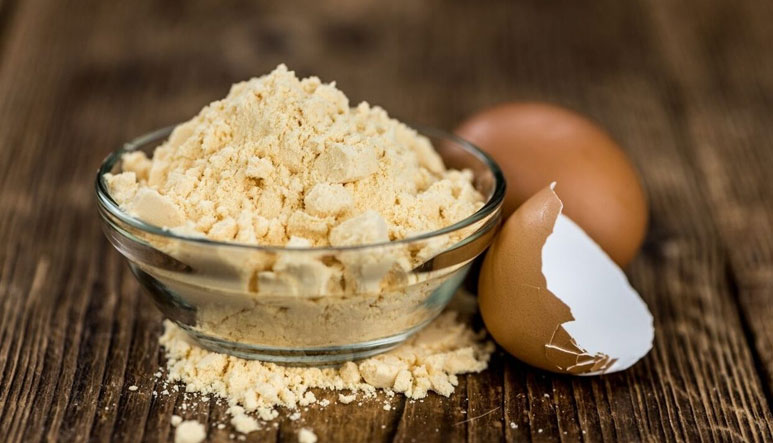Egg Powder

Egg Powders – Convenient, Nutritious, and Versatile
Egg powders are dehydrated egg products that provide the same nutritional benefits as fresh eggs with the advantages of longer shelf life, easy storage, and convenience. Used extensively in food processing, baking, and industrial applications, egg powders come in different forms based on the egg parts and processing.
Types of Egg Powders
-
Whole Egg Powder
-
Description: Made from whole eggs (yolk + white) that are pasteurized, spray-dried, and milled into powder.
-
Nutrition: Rich in protein, vitamins A, D, E, B12, choline, and healthy fats.
-
Applications: Baking (cakes, bread, cookies), confectionery, sauces, pasta, and snacks.
-
Advantages: Balanced egg flavor and nutrition similar to fresh eggs.
-
-
Egg White Powder
-
Description: Made from egg whites separated from yolks, then pasteurized and spray-dried.
-
Nutrition: High in protein (albumin), low in fat and cholesterol.
-
Applications: Protein supplements, bakery products, meringues, egg white omelets, and sports nutrition.
-
Advantages: Excellent for low-fat, low-cholesterol food formulations.
-
-
Egg Yolk Powder
-
Description: Produced by drying pasteurized egg yolks, preserving the rich flavor and fat content.
-
Nutrition: High in healthy fats, vitamins A, D, E, and lecithin.
-
Applications: Mayonnaise, dressings, sauces, custards, ice creams, and specialty bakery products.
-
Advantages: Adds richness, color, and emulsifying properties.
-
-
Salted Egg Powder
-
Description: Made from salted duck eggs, dried and powdered. Popular in Asian cuisines.
-
Nutrition: Contains high protein, salt content, and unique umami flavor.
-
Applications: Snacks, sauces, bakery items, savory dishes, and instant foods.
-
Advantages: Unique salty flavor and color enhancer.
-
-
Organic Egg Powder
-
Description: Made from eggs sourced from organically raised hens without antibiotics or hormones.
-
Nutrition: Same as whole egg powder but from organic sources.
-
Applications: Organic food products, health foods, baby foods, and premium bakery.
-
Advantages: Organic certification and cleaner label for health-conscious consumers.
-
Nutritional Highlights (Typical per 100g)
| Type | Protein (g) | Fat (g) | Cholesterol (mg) | Calories (kcal) |
|---|---|---|---|---|
| Whole Egg Powder | 45–50 | 35–40 | 1000–1200 | 600–650 |
| Egg White Powder | 80–85 | <1 | 0 | 350–370 |
| Egg Yolk Powder | 30–35 | 50–55 | 1500–1800 | 650–700 |
| Salted Egg Powder | 50–55 | 40–45 | High | 600–650 |
| Organic Egg Powder | 45–50 | 35–40 | 1000–1200 | 600–650 |
*Values can vary based on processing and origin.
Processing Methods
-
Eggs are cleaned, cracked, and separated (if required).
-
Pasteurized to eliminate pathogens.
-
Spray dried or drum dried to powder form.
-
Sieved and packed in moisture-proof packaging.
-
May undergo additional treatments for salted or organic varieties.
Applications
-
Baking: Bread, cakes, biscuits, cookies, muffins.
-
Confectionery: Chocolates, nougats, fillings.
-
Food Industry: Mayonnaise, sauces, pasta, soups.
-
Sports Nutrition: Protein bars, powders, supplements.
-
Convenience Foods: Instant mixes, ready-to-eat meals.
Why Choose Our Egg Powders?
-
Hygienically processed and pasteurized
-
High nutritional value and excellent functional properties
-
Long shelf life and stable at room temperature
-
Easy to transport and store with reduced weight and volume
-
Available in bulk, retail, and custom packaging
-
Certified for food safety and quality standards (ISO, HACCP, etc.)
